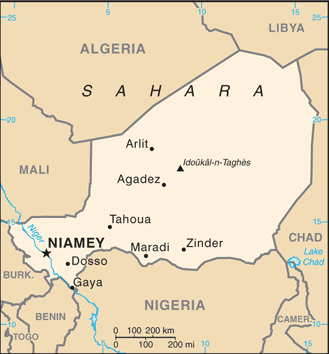Niger

The Republic of Niger has an estimated population of 15.8 million (UN, 2010). The capital is Niamey. Niger has an area of 1.27 million sq km (489,000 sq miles). The main languages are French (official), Arabic, Haussa, and Songhai
Niger became independent in 1960 from France. Until 1991, a single military party ruled Niger. The first democratic government was formed in 1993. Since gaining independence, Niger has been beset by military coups with the latest occurring in February 2010. Niger is one of the poorest countries in the world and depends heavily on foreign aid.
The Nigerian family law discriminates against women. Traditional practices that regulate the living conditions of women coupled with the slow progress of the government to protect and guarantee women their rights, offer little opportunity for women to seek protection. Violence against women, such as domestic violence and female genital mutilation, is common in Niger. Domestic violence is reported to family or traditional courts.
- Niger signed the Protocol to the African Charter on Human and Peoples' Rights on the Rights of Women in Africa (The Maputo Protocol) on the 6th of July 2004 but has not ratified.
- The Convention on the Elimination of All Forms of Discrimination against Women (CEDAW) was ratified by Niger on the 8th of October 1999.
- Niger has not yet adopted a National Action Plan on United Nations Security Council Resolution 1325 (UNSCR 1325).
- There is no former or current UN Peacekeeping mandate in Niger
